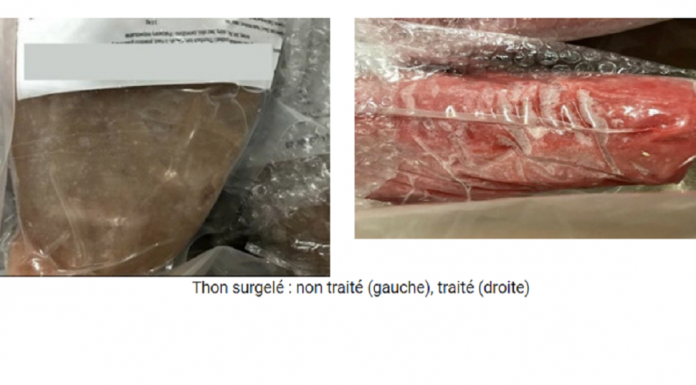FOOD SAFETY NEWS – Food safety officials in Belgium seized almost 80,000 tons of tuna in the course of a few months in 2020.
More than 90 percent of non-compliant products were imported from Asia.
Between September and December 2020, the Federal Agency for the Safety of the Food Chain (FASFC) took 45 samples of fresh and frozen tuna from retailers and frozen tuna from wholesalers and carried out 92 types of analysis. In 2019, there were 17 samples analyzed and all were compliant.
For 2020 FASFC, also known as AFSCA or FAVV, uncovered the use of carbon monoxide treatment, a technique banned for tuna in Europe.
“China’s exports of canned tuna and tuna loins surpassed 100,000 metric tons for the first time as the country’s tuna packers offset a 10% decline in exports to the US by selling more to Spain, according to trade data… ” – Undercurrent News, March 2019
Varieties of fish fraud
The objective of the operation was to detect the use and frequency of fraud techniques that are used to hide the spoilage of the fish going brown by passing it off as a fresher item that stays red.
Investigators looked at different techniques such as the addition of dyes, nitrites or nitrates and carbon monoxide treatment.
More than 35,000 tons of tuna was seized because of carbon monoxide treatment.
When a non-compliant batch was found measures included destruction or re-export and communication with the European Commission’s Food Fraud Network.
Five of six samples were found to have undergone carbon monoxide treatment.
Almost half of the 25 samples were non-compliant for nitrite or nitrate levels. Sixteen of 29 tests were non-compliant for amounts of ascorbic acid, which is limited to 300 milligrams per kilogram in EU regulations.
All 15 samples looking at histamine and total volatile base nitrogen were satisfactory. Consuming foods with high histamine levels poses a risk to health and it is not destroyed by cooking or freezing fish. Production of histamine is related to storage at incorrect temperatures. Histamine in fresh tuna from Sri Lanka was linked to the illness of two people in Belgium in August 2020.
Wider EU problem
Following the results, AFSCA included carbon monoxide in routine checks as part of its control plan in 2021 and stepped up inspections on imports of tuna from non-EU countries.
In 2020, the National Investigation Unit of FASFC handled nearly 800 cases related to fraud.
In 2016, the European Commission was told tuna for canning was being treated with vegetable extracts containing a high concentration of nitrites to alter fish color. In 2017, seven people were investigated as part of Operation Nuta. One year later, 79 people were arrested in Operation Tarantello and operations Atunali and ATYH 2 both saw four people investigated in the same year.
David Clarinval, federal minister of Agriculture and SME’s in Belgium, said the action illustrates the efforts made by FASFC to fight against all types of fraud to protect consumers.
“This protection comes through the hundreds of routine inspections carried out every day, and through checks on imported products.”
(To sign up for a free subscription to Food Safety News, click here.)
HEADLINE HEALTH has extensively covered problems with food safety on food from Asia:
Federal Warning On Illegally Imported Catfish
Food Poisoning Costs China $30B A Year: World Bank



